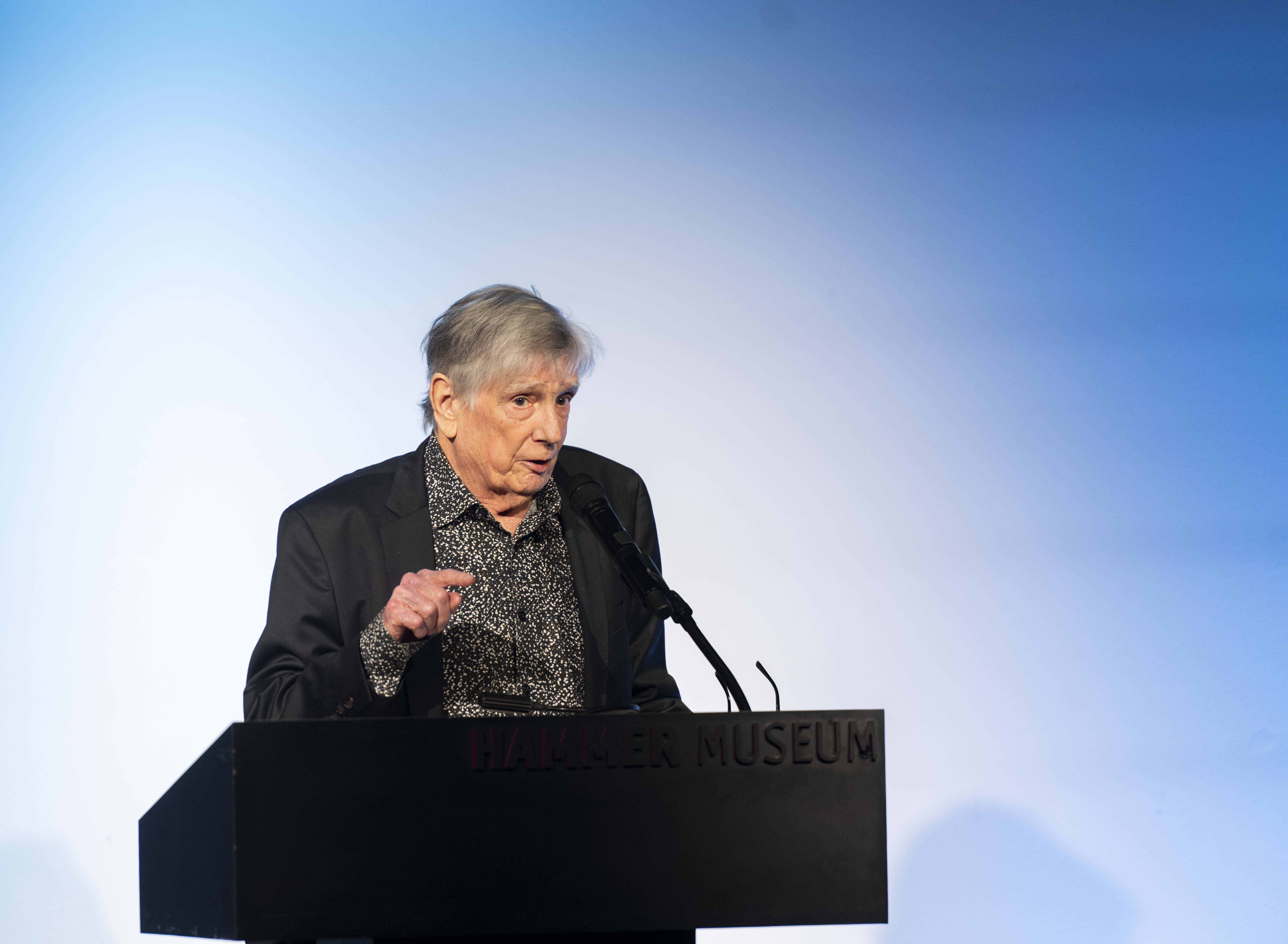Rosanna Warren transforms life into written word at Hammer Museum poetry event
Rosanna Warren (left) and Stephen Yesner (right) sit on the stage during a Hammer Museum event. Warren recited poetry and participated in a Q&A segment. (Andrew Diaz/Daily Bruin)
By Amy L. Wong
April 13, 2025 6:13 p.m.
This post was updated April 13 at 7:32 p.m.
Rosanna Warren translated everyday situations through her poetry for an audience at the Hammer Museum on Thursday.
As a poet, translator and painter, Warren said during a poetry reading event at the Hammer Museum that her unique educational background influenced her poetry as it gave her the power to play with structures such as hexameters and pentameters. Raised partly in France, she said she grew up thinking in French and eventually learned Italian, Greek and Latin. Warren added that she edited translations of other people’s poetry at Princeton University Press. Understanding other languages and cultures helps people expand their conceptions about what it means to be a human, Warren said. She added that working with different languages allowed her poetry to be more natural.
“I like to play different metrical patterns against English,” Warren said. “It doesn’t feel mechanical to me. It feels like musicianship.”
Additionally, she said she started out as a painter and attended art schools. When she could not depict what she wanted to convey through painting, Warren said she would turn to words through song. Warren added that she seeks to enchant people through her poetry. Her work tends to be visual, she said, because she writes it by hand, including a 700-page book she wrote that took her 35 years to complete.
While her work is not intended to be political, Warren said her poetry can reflect the stressors of certain time periods. One of her poems she read is titled “Shelf” and is about the genocide of the Armenians in the early 20th century in Turkey. Additionally, in the middle of one of her most recent books of poetry titled “So Forth,” Warren wrote a series of poems about notable female artists. One of these pieces is about Coco Chanel, whom Warren said she views as a “moral monster.” Another of her poems is titled “A New Year” and explores a sad country. The unhappiness in the United States has been more prominent since the 2024 general election in November, Warren said.
“I use the word ‘revenge’ in the Chanel poem. There’s a different kind of revenge, I think, intuitive in this poem about a country that’s very unhappy – populations, plural – very unhappy in different ways, some of them wanting revenge,” Warren said. “I’m frankly so frightened about this country.”

Ariel Banayan, an attendee of the event, said he especially enjoyed the last poem Warren read about making paper mache out of newspapers with her five-year-old grandson. In her poetry, her grandson ripped up newspapers published by the New York Times about the war in Ukraine. Banayan said he appreciated the double meaning of the piece. Reading out the poem, Warren said, “We’re free to shred home countries on the kitchen floor, and while we’re at it, why not family feuds, our own mildewed archive of injury and revenge.”
As a poet himself, writing poetry since the 1970s and self-publishing over 25 books, Cas Richardsen, an attendee of the event, said he noticed the creativity in Warren’s poetry that involved seeing nature rather than touching it. Warren said she spent a significant amount of time in the woods, adding that during the COVID-19 pandemic, she lived in a cabin in the Catskill Mountains. In the mountains, there were many animals in the summer and fall, including snakes, which Warren said she fears.
Warren’s work stands out because of how grounded it is, said Lindsay Bettencourt, another attendee. She added that Warren also uses many “K” and “S” sounds in her poetry and that she enjoys the sounds created through her work. One poem she enjoyed was about a snake trying to make its way through a shaky house, Bettencourt added, because of how the poem tied in mathematics. Warren said based on her conversations with mathematicians, mathematics is not as stable as people think it is. She was proud of the poem, Warren added, and a mathematician in England asked if they could quote it since it described their theory of mathematics.
After teaching at Boston University for 25 years and 10 years at the University of Chicago, Warren said she noticed some students were “hungry for poetry,” and some were “eager for song.” She added that her students’ interest in poetry lifted her spirits. While she cannot predict how poetry will change in the future, she said she ultimately hopes it will not be generated by artificial intelligence.
“Human beings need song,” Warren said. “I want the human beating. I want the human soul.”
